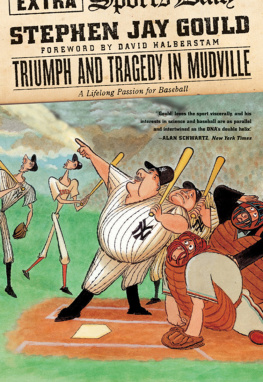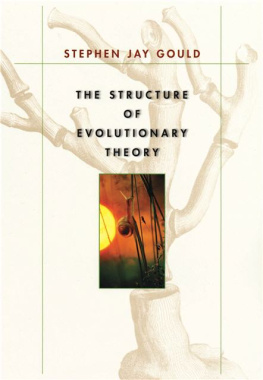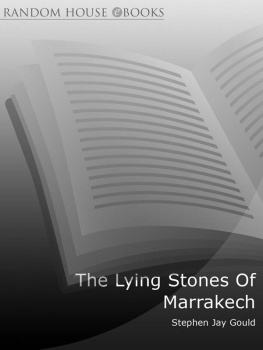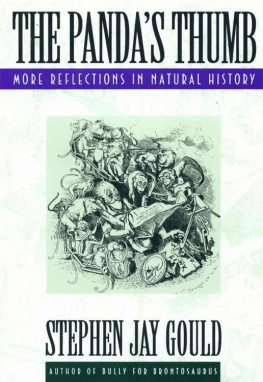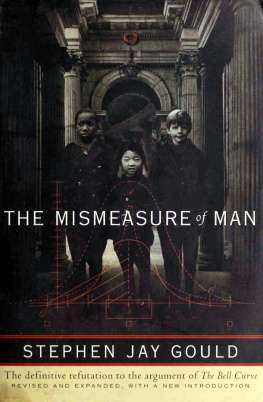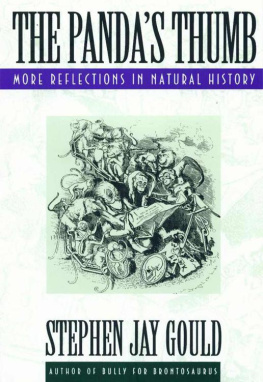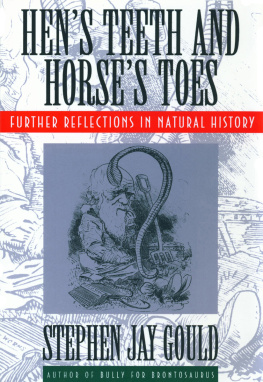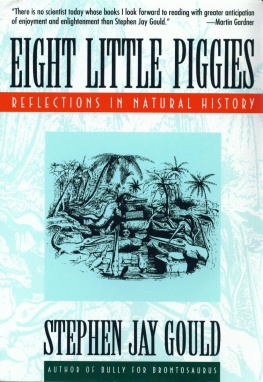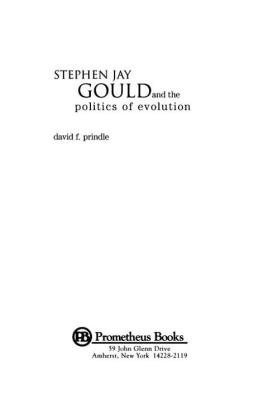Ever Since Darwin
Reflections in Natural History
Stephen Jay Gould

W. W. NORTON & COMPANY. NEWYORK.LONDON
FOR MY FATHER
Who took me to see the
Tyrannosaurus when I was five
Contents
ONE HUNDRED YEARS without Darwin are enough, grumbled the noted American geneticist H.J. Muller in 1959. The remark struck many listeners as a singularly inauspicious way to greet the centenary of the Origin of Species, but no one could deny the truth expressed in its frustration.
Why has Darwin been so hard to grasp? Within a decade, he convinced the thinking world that evolution had occurred, but his own theory of natural selection never achieved much popularity during his lifetime. It did not prevail until the 1940s, and even today, though it forms the core of our evolutionary theory, it is widely misunderstood, misquoted, and misapplied. The difficulty cannot lie in complexity of logical structure, for the basis of natural selection is simplicity itselftwo undeniable facts and an inescapable conclusion:
1.Organisms vary, and these variations are inherited (at least in part) by their offspring.
2.Organisms produce more offspring than can possibly survive.
3.On average, offspring that vary most strongly in directions favored by the environment will survive and propagate. Favorable variation will therefore accumulate in populations by natural selection.
These three statements do ensure that natural selection will operate, but they do not (by themselves) guarantee for it the fundamental role that Darwin assigned. The essence of Darwins theory lies in his contention that natural selection is the creative force of evolutionnot just the executioner of the unfit. Natural selection must construct the fit as well; it must build adaptation in stages by preserving, generation after generation, the favorable part of a random spectrum of variation. If natural selection is creative, then our first statement on variation must be amplified by two additional constraints.
First, variation must be random, or at least not preferentially inclined toward adaptation. For, if variation comes prepackaged in the right direction, then selection plays no creative role, but merely eliminates the unlucky individuals who do not vary in the appropriate way. Lamarckism, with its insistence that animals respond creatively to their needs and pass acquired traits to offspring, is a non-Darwinian theory on this account. Our understanding of genetic mutation suggests that Darwin was right in maintaining that variation is not predirected in favorable ways. Evolution is a mixture of chance and necessitychance at the level of variation, necessity in the working of selection.
Secondly, variation must be small relative to the extent of evolutionary change in the foundation of new species. For if new species arise all at once, then selection only has to remove former occupants to make way for an improvement that it did not manufacture. Again, our understanding of genetics encourages Darwins view that small mutations are the stuff of evolutionary change.
Thus, Darwins apparently simple theory is not without its subtle complexities and additional requirements. Nonetheless, I believe that the stumbling block to its acceptance does not lie in any scientific difficulty, but rather in the radical philosophical content of Darwins messagein its challenge to a set of entrenched Western attitudes that we are not yet ready to abandon. First, Darwin argues that evolution has no purpose. Individuals struggle to increase the representation of their genes in future generations, and that is all. If the world displays any harmony and order, it arises only as an incidental result of individuals seeking their own advantagethe economy of Adam Smith transferred to nature. Second, Darwin maintained that evolution has no direction; it does not lead inevitably to higher things. Organisms become better adapted to their local environments, and that is all. The degeneracy of a parasite is as perfect as the gait of a gazelle. Third, Darwin applied a consistent philosophy of materialism to his interpretation of nature. Matter is the ground of all existence; mind, spirit, and God as well, are just words that express the wondrous results of neuronal complexity. Thomas Hardy, speaking for nature, expressed his distress at the claim that purpose, direction, and spirit had been banished:
When I took forth at dawning, pool,
Field, flock, and lonely tree,
All seem to gaze at me
Like chastened children sitting silent in a school;
Upon them stirs in lippings mere
(As if once clear in call,
But now scarce breathed at all)
We wonder, ever wonder, why we find us here!
Yes, the world has been different ever since Darwin. But no less exciting, instructing, or uplifting; for if we cannot find purpose in nature, we will have to define it for ourselves. Darwin was not a moral dolt; he just didnt care to fob off upon nature all the deep prejudices of Western thought. Indeed, I suggest that the true Darwinian spirit might salvage our depleted world by denying a favorite theme of Western arrogancethat we are meant to have control and dominion over the earth and its life because we are the loftiest product of a preordained process.
In any case, we must come to terms with Darwin. And to do this, we must understand both his beliefs and their implications. All the disparate essays of this book are devoted to the exploration of this view of lifeDarwins own term for his new evolutionary world.
These essays, written from 197477, originally appeared in my monthly column for Natural History Magazine, entitled This View of Life. They range broadly from planetary and geological to social and political history, but they are united (in my mind at least) by the common thread of evolutionary theoryDarwins version. I am a tradesman, not a polymath; what I know of planets and politics lies at their intersection with biological evolution.
I am not unmindful of the journalists quip that yesterdays paper wraps todays garbage. I am also not unmindful of the outrages visited upon our forests to publish redundant and incoherent collections of essays; for, like Dr. Seuss Lorax, I like to think that I speak for the trees. Beyond vanity, my only excuses for a collection of these essays lie in the observation that many people like (and as many people despise) them, and that they seem to cohere about a common themeDarwins evolutionary perspective as an antidote to our cosmic arrogance.
The first section explores Darwins theory itself, especially the radical philosophy that inspired H.J. Mullers complaint. Evolution is purposeless, nonprogressive, and materialistic. I approach the heavy message through some entertaining riddles: who was the Beagles naturalist (not Darwin); why didnt Darwin use the word evolution; and why did he wait twenty-one years to publish his theory?
The application of Darwinism to human evolution forms the second section. I try to stress both our uniqueness and our unity with other creatures. Our uniqueness arises from the operation of ordinary evolutionary processes, not from any predisposition toward higher things.
In the third section, I explore some complex issues in evolutionary theory through their application to peculiar organisms. On one level, these essays are about deer with giant antlers, flies that eat their mother from inside, clams that evolve a decoy fish on their rear end, and bamboos that only flower every 120 years. On another level, they treat the issues of adaptation, perfection, and apparent senselessness.


